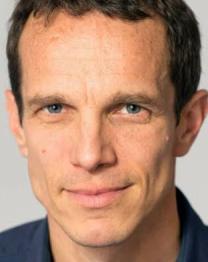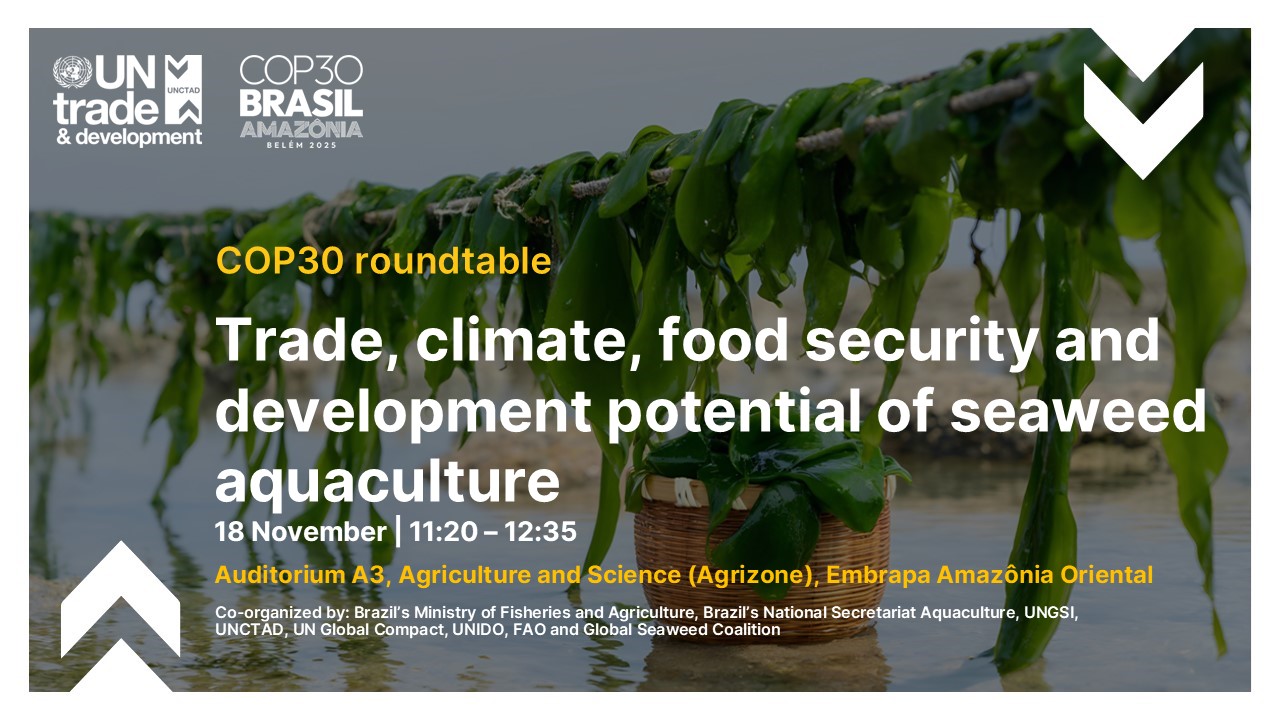
Background
Seaweed serves as a sustainable and nutritious food source, offering substantial environmental benefits such as carbon capture and habitat restoration, making it a powerful tool to mitigate but also to adapt to climate change. Additionally, the seaweed industry holds considerable economic promise for food and non-food products, particularly coastal communities in developing countries, by creating jobs and fostering inclusive growth. Seaweed can also be cultivated in an Integrated Multi-Trophic Aquaculture involving other living marine resources.
Over the past two decades, the global seaweed sector has tripled in size and doubled in value, reaching more than 35 million tonnes (wet weight) in 2022. Today, seaweed represents half of marine aquaculture production by volume, with exports valued at US$1.2 billion. Yet despite this growth, the sector remains under-supported and lacks the coordination, standards and dedicated governance needed to fully deliver on its potential and contribute to SDGs.
At the 3rd UN Ocean Conference (UNOC-3), the United Nations Global Seaweed Initiative (UNGSI) was announced by Madagascar, Indonesia and France, with support from UNCTAD, UN Global Compact-the Global Seaweed Coalition, FAO, UNIDO and UNESCO-IOC, alongside private sector, scientific and civil society partners following a recommendation from the 5th United Nations Ocean Forum.
The UNGSI will be launched at UNGA80 in September 2025 by an enlarged coalition of Members States and partners.
Objective
The objective of this event is to explore the multifaceted benefits and opportunities of regenerative and low carbon aquaculture with a focus on seaweed aquaculture. By examining its potential to enhance trade, mitigate and adapt to climate change, bolster food security and circularity, and drive sustainable development, the event aims to foster a comprehensive understanding of seaweed's role in achieving SDGs 2, 13, 14 and 17.
The event will feature a series of policy makers, UN agencies and scientific expert presentations in the form of interactive panel discussions, highlighting successful case studies and innovative practices from around the world. Participants will gain insights into the latest research, policy frameworks, and market trends driving the seaweed sector.
Expected outcome
The event will allow participants of a better understanding of the potential of multitrophic and circular seaweed cultivation, processing and trade to response to multifaceted food, climate and development challenges that can be replicated and scaled up in a developing country context.
Tentative agenda
Moderator
- Mr. Vincent Doumeizel, Senior Advisor on Oceans, United Nations Global Compact and Global Seaweed Initiative
Panellists
- H.E. Ms. Fernanda Gomes de Paula, the Vice-Minister for Aquaculture of Brazil
- Mr. Ade Renaldi Satari, Senior Advisor to the Minster of Marine Affairs and Fisheries, Indonesia
- Mr. Nagamori Kazumasa, Director, Climate Change Observation Research Strategy Office
Ministry of the Environment, Japan - Ms. Chantal Line Carpentier, Head of the Trade, Environment, Climate Change and Sustainable Development Branch, UN Trade and Development
- Mr. Clovis Zapata, UNIDO representative, Brazil
Vincent Doumeizel is Senior Adviser on the oceans to the United Nations Global Compact as well as director of the Food Programme at the Lloyd’s Register Foundation.
A self-described optimist and global citizen, Vincent has in recent years devoted himself to promoting a food revolution and environmental solutions based on sea resources, especially seaweed. Vincent leads the charitable objectives of the Foundation through the funding of innovative projects to drive safety in the food supply chain.
Partnering with the UN, FAO, World Bank, WWF, universities, NGOs and large brands, Vincent released the “Seaweed Manifesto” and now co-leads the Global Seaweed Coalition with the objective to scale up the seaweed industry safely in order to address some of the world’s most important challenges, such as hunger, global warming, pollution and poverty.
Ms Fernanda Gomes de Paula serves as the Vice-Minister for Aquaculture of Brazil. An Associate Professor at the Federal University of Goiás (UFG), she holds a bachelor's degree in Animal Science (2004) from the Federal University of Tocantins (UFT).
She earned a master's degree in Animal Science (2009) and a doctorate in Animal Science (2012), both from the Federal University of Goiás (UFG). From 2003 to 2004, she was an Intern and Researcher at the Federal University of Tocantins. From 2004 to 2006, she worked as a Zootechnician at Aquicultura Fazenda São Paulo.
From 2006 until her secondment to the MPA, she served as a Professor and Researcher at the Federal University of Goiás.

Renaldi Satari currently serves as the Special Assistant to the Minister of Marine Affairs and Fisheries of the Republic of Indonesia. In this capacity, he provides strategic support and policy advisory in areas related to marine spatial planning, blue carbon ecosystem conservation, and international cooperation.
He plays an active role in strengthening Indonesia's engagement in global marine and fisheries forums, as well as securing innovative sustainable financing to advance the Ministry's strategic programs and national priorities in marine affairs.
Mr. Satari holds a Master of Science in Japanese Business Studies from Chaminade University, Hawaii, and a Bachelor's degree in Civil Engineering from Institut Teknologi Bandung. His multidisciplinary background in engineering, business, and public policy underpins his long-standing commitment to sustainable ocean management and the development of Indonesia's blue economy.
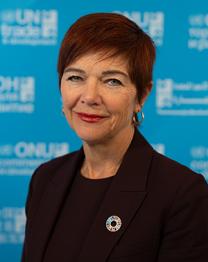
Dr. Carpentier, from Quebec, Canada, is Head of Trade, Environment, Climate change, and Sustainable Development Branch of UNCTAD’s Division on International Trade and Commodities (DTIC). Her work with governments and partners foster green, blue, circular, and impact economies that supported by trade, are key to addressing the triple planetary crisis: climate change, pollution and biodiversity loss. She came to Geneva after leading the UNCTAD New York office, representing the SG and coordinating UNCTAD’s support to inter-governmental negotiations of the UN General Assembly (2015-2023).
She held several other positions. At the UN Department of Economic and Social Affairs, she facilitated the engagement of NGOs, women and youth’s groups, business, local authorities, etc. in the SDGs negotiations and the UN Rio+20 Conference (2011-2015). She also supported the Commission on Sustainable Development research and negotiations on sustainable agriculture and sustainable consumption and production (2007-2011).
Prior to joining the UN, she Headed the North American Free Trade Agreement Commission for Environmental Cooperation’s, Environment, Economy and Trade Division (2000-2007), was Agro-environmental policy analyst for Winrock International (1998-2000) and post-Doctoral fellow/Brazil office manager for the International Food Policy Research Institute (1996-1998).
She has a PhD. in Agro-Environmental Economics from Virginia Tech, as well as a MSc. and BSc. in Agro- Economics from McGill University and is an ironman and ultramarathoner. She is a Yale World Fellow, received the 2023 Schwab Foundation for Social Entrepreneurship public intrapreneur award, and is a UNEP Who’s Who of Women and the Environment.
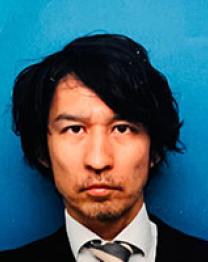
Mr. Nagamori Kazumasa, is Director of Climate Change Observation Research Strategy Office, Ministry of the Environment, Japan.
He is a climate and environment policy specialist with 20 years of experience at the Ministry of the Environment, Japan, and expertise in JCM (Joint Crediting Mechanism) expansion, GHG observation satellites (GOSAT series), and Blue Carbon policy, and international climate negotiations (UNFCCC), and experience working with UNIDO – with a strong focus on bridging science, technology, startup, and policy for decarbonization and global environmental cooperation.
He holds a Master’s degree from the Australian National University (ANU) and the University of Melbourne.
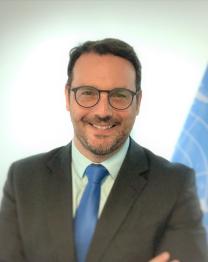
Clovis Zapata is the Representative of the United Nations Industrial Development Organization - UNIDO for Brazil.
He has more than 25 years of experience working as an economist for various international organizations, including the World Bank, UNDP, WWF, and the ESRC BRASS Centre. He has held positions in the Brazilian Federal Government and in academia in in the United Kingdom, United States, Brazil, and Italy.
He holds a Ph.D. in Industrial and Environmental Economics from Cardiff University, United Kingdom, and the University of California, USA, and BA and MSc degrees in Economics.



